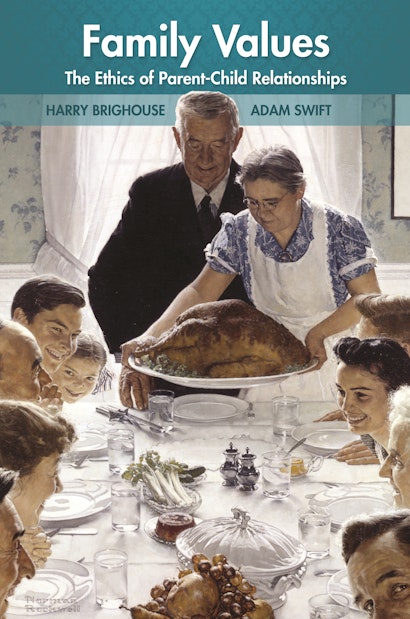The family is hotly contested ideological terrain. Some defend the traditional two-parent heterosexual family while others welcome its demise. Opinions vary about how much control parents should have over their children’s upbringing. Family Values provides a major new theoretical account of the morality and politics of the family, telling us why the family is valuable, who has the right to parent, and what rights parents should—and should not—have over their children.
Harry Brighouse and Adam Swift argue that parent-child relationships produce the “familial relationship goods” that people need to flourish. Children’s healthy development depends on intimate relationships with authoritative adults, while the distinctive joys and challenges of parenting are part of a fulfilling life for adults. Yet the relationships that make these goods possible have little to do with biology, and do not require the extensive rights that parents currently enjoy. Challenging some of our most commonly held beliefs about the family, Brighouse and Swift explain why a child’s interest in autonomy severely limits parents’ right to shape their children’s values, and why parents have no fundamental right to confer wealth or advantage on their children.
Family Values reaffirms the vital importance of the family as a social institution while challenging its role in the reproduction of social inequality and carefully balancing the interests of parents and children.
"Brighouse and Swift raise some important issues and come to some conclusions that are bound to be controversial, which is exactly why this book is so important and so worthy of considerable thought and debate. The work is scholarly and well documented, with 30 pages of notes and bibliography accompanying the 181-page text. That's a welcome distinction over the political diatribes that often cloud family value debates. . . . Highly recommended."—Talking Ethics
"This thoughtful work addresses tensions between the liberty of parents to raise children as they see fit, parents' duty to ensure that children develop the capacity for autonomy, and the role of the family as an obstacle to fair equality of opportunity."—Choice
"It presents and negotiates the issues at stake in exceptionally nuanced, elegant and meticulously-crafted ways."—Gideon Calder, European Journal of Political Theory
"In their clearly written and elegantly structured book, Harry Brighouse and Adam Swift develop a normative account of child-rearing that deftly weaves together positions associated with both the political left and the right. . . . Their principled account of the rights of parents and children is the best of which I am aware, and I expect it to set the standard for discussion of these issues for some time to come."—George Sher, Social Theory and Practice
"Family Values is an original, important, and well-written book that will influence the discussion concerning the moral status of the family for years to come, and it can be recommended to any reader who is interested in this topic."—Jörg Löschke, Ethical Theory and Moral Practice
"This important contribution to an emerging field does not only target an audience of moral and political philosophers. Written in an extremely accessible style, it should also interest social scientists, educators and family law scholars. This book should be highly helpful to tackle issues such as child custody, family reunification, parental education or surrogacy."—Danielle Zwarthoed, Journal of Moral Philosophy
"Lucidly written, clearly-structured, with plenty of thought-provoking ideas and examples."—Christopher Cowley, International Journal of Philosophical Studies
"Family Values is an important book on a neglected topic by two excellent scholars. It advances an original argument, and does so clearly and accessibly. Highly recommended."—Stephen Macedo, Princeton University
"This book goes a long way to illuminating what is at stake in debates about family values and brings much-needed reasoned analysis to important questions in contemporary democratic politics. A major contribution to political philosophy, Family Values will significantly raise the level of informed public discourse on the subject."—Colin M. Macleod, coeditor of The Moral and Political Status of Children



